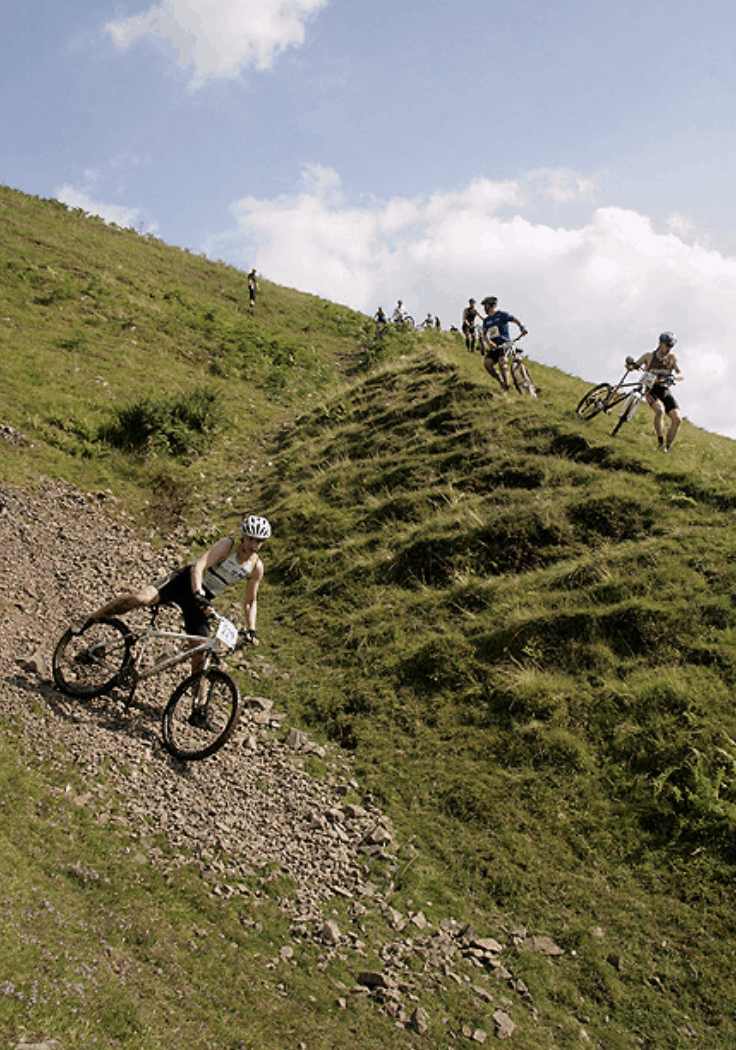Triathlons can be amazing to participate in, but there are few things that can beat doing a triathlon with the added difficulty of having to bike and run over terrain that is more technical instead of ever a smooth road.
This is the main difference between off-road and road triathlons, and the one that comes to mind. However, you should know that this affects practically everything about the triathlon, and especially the gear that you will need to use.
Sometimes off-road triathlons are called cross-country triathlons, and sometimes that is shortened to just cross triathlons. This being the case, if you are in doubt there is no harm in asking and you should always verify the details of the triathlon anyway.
The Differences In Gear For The Biking
This area is where you will find the most in terms of differences. This is because a mountain biking trail is a whole lot different than a road most of the time. Therefore, it is important that your gear in this area reflects this change.
Your Bike
This is no doubt the first thing that you will think about when it comes to your gear for the biking stage of the triathlon. There is actually a rule that says you have to have a mountain bike for the mountain bike trails, so there is no getting around that.
As for road triathlons, there is no doubt that a road bike is going to work better and be faster on the road than a mountain bike is. However, you should be aware of the fact that there are bikes that are specifically made for triathlons, and you should look at these.
Your Helmet
This will depend some on your own personal preferences. When you are riding on the road you should of course always use a road helmet. If you really like road helmets and prefer them to mountain biking helmets, then you may be allowed to wear a road helmet for a mountain biking trail.

Still, it is far better to wear a mountain biking helmet when you are on a mountain biking trail. On some trails there may be branches that come out at you and having a mountain biking helmet with a visor is vital in this case.
Eye Protection
While some people do not like wearing anything for their eyes, this is something that you can only get away with if you are riding on a road where there is not a whole lot that might get kicked up into your eyes.
Even on the road, you should still have a good pair of safety glasses – sunglasses if you are going to be riding towards the sun or even if it is just a bright day. In a cross triathlon, however, glasses of some sort are an absolute necessity.
There is a lot more that can be kicked up on a dirt trail not to mention the possibility of an overhanging branch that might swipe at your face. If the weather is rainy or has been rainy recently, then you will need to have more than just glasses, you will need to wear goggles.
The wet weather won’t affect you on the road nearly as much as it will on the trail, meaning that you might be able to get away with not wearing goggles on the road, but on the trail the dirt will soon turn to mud.
All in all, in either case you want to pay really close attention to the lighting. If it is going to be a cloudy day or really early in the morning before the sun gets too bright, then you may want to go with a lens that is clear or close to it. The brighter the day is the darker your lenses should be.
Your Shoes And Socks
Mountain bikes themselves are very different from road bikes, including in the area of the pedals. So it is only understandable that the shoes that you have to wear with each are also different. The cleats of these shoes are very different, but that is not all.
Depending on the particular trail, you may end up with one that has a hike a bike section when you will have to get off of your bike and jog beside it. This is never something that will happen in a road triathlon, therefore it is perfectly acceptable for the road shoes to be stiffer.
This is also why when you are on a cross country trail you will want your shoes to be slightly more flexible. That way, if you do have to do some walking for whatever reason, they are not so stiff and uncomfortable that they slow you down.
When it comes to socks, again, there is some preference involved. If you do not like socks then you do not have to wear them for either type of triathlon. Even if you do like wearing socks with your shoes, however, then you may not want to wear them for the off-road triathlon.
This is because your skin will still likely be at least a little wet when you put your socks on, making them damp. On the road there is no problem with this, but on the trail where dirt is being kicked up it will stick to your damp socks.
This will get your socks dirty, and you will not be wanting dirty socks when you change shoes. This is especially true if there are small rocks and things like that which might end up in your running shoes when you transition to running. In short, you should not wear socks for the cross triathlon biking stage.
The Differences In Gear For The Running
While there may be fewer differences here that you have to think about, you should be prepared mentally for it to be harder to run. Not only is there more likely to be uphill and downhill sections that you have to run, but you may also have to pick up your feet more to avoid tripping on a root or rock.
This will make the running seem to take a lot longer and it will take up more of your energy the more technical the trail is that you are running. This is why you will need to practice running on trails for off-road triathlons.
Your Shoes And Socks
These will depend on what you prefer and on what you will be running on. Even if you are running a cross run, if the trail is pretty flat and maybe even has sections of pavement to it then you may want to wear regular race flats.
On the other hand, if the course you are running is more like an animal trail that is barely marked, then you will definitely want to go with shoes that are made for running on trails. This also applies when it comes to wet conditions since the running shoes that are made for the pavement only will have virtually no grip in muddy conditions.
While you do not want to wear socks in the biking section of a cross triathlon, it is equally a must that you do wear socks in the running section. This is because dirt can be very abrasive if it gets into your shoe and is being rubbed right against your skin.
Again, if you do or don’t want to wear socks for the road running, it won’t really matter too much. Your feet might actually be cooler without the socks on depending on how good a job your shoes do at circulating the air around your feet.
Final Differences
While those are the main differences that you will find, there are still others that you might be surprised to know about. Depending on which rulebook is being followed, the difference between the two can even affect the swimming stage of the triathlon.
If the race is governed by ITU rules or the rules for XTERRA events it will determine what you are and are not allowed to wear. In the XTERRA events you are even allowed to wear the rubbery kind of swimskins that were banned by the Ironman triathlons, and is one kind where you are not allowed to change clothes, so make sure to pay attention to which rules the triathlon you are participating in goes by.

